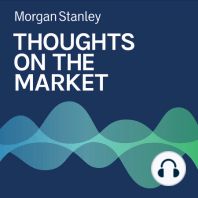3 min listen

Jonathan Garner: An Unusual Cycle for Asia and EM Equities
Jonathan Garner: An Unusual Cycle for Asia and EM Equities
ratings:
Length:
3 minutes
Released:
Sep 29, 2022
Format:
Podcast episode
Description
Asia and EM equities are on the verge of the longest bear market in their history, so what is the likelihood that a sharp fall in prices follows soon after?----- Transcript -----Welcome to Thoughts on the Market. I'm Jonathan Garner, Chief Asia and Emerging Market Equity Strategist at Morgan Stanley. Along with my colleagues, bringing you a variety of perspectives, today I'll be discussing the ongoing bear market in Asia and Emerging Market equities. It's Thursday, September the 29th at 8 a.m. in Singapore. We have repeatedly emphasized that patience may be rewarded during what will likely, by the end of this month, become the longest bear market in the history of Asia and Emerging Market equities. Indeed, we argued that the August Jackson Hole speech by Fed Chair Powell, and the mid-September upside surprise in U.S. CPI inflation likely accelerated a downward move towards our bear case targets near term. And in recent weeks, the MSCI Emerging Markets Index has indeed given back almost all of the gains it had recorded from the COVID recession lows. To our mind, this raises the likelihood that a classic capitulation trough, a sudden sharp fall in prices and high trading volumes, could be forming in a matter of weeks. Now, all cycles are not made alike, and this one is unusual in a number of key regards. Most notably, the dislocations in the supply side of the global economy caused by COVID and geopolitics. Moreover, China is not easing policy to the same extent as helped generate troughs in late 2008 and early 2016. Thus, caution is warranted in drawing too firm a set of conclusions from relationships that have held in the past. That said, by the end of this month, the current bear market will likely become the longest in the history of the asset class, overtaking in days duration that triggered by the dot com bust in the early 2000's. And after a more than 35% drawdown, the MSCI Emerging Markets Index is now trading close to prior trough valuations at only 10x price to consensus forward earnings. Our experience covering all previous bear markets back to 1997/1998 suggests to us ten sets of indicators to monitor. We've recently undertaken an exercise to score each indicator from 1, which equates to a trough indicator not enforced at all to 5, which indicates a compelling trough indicator already in place. Currently, the sum of the scores across the factors is 32 out of a maximum of 50, which we view as suggesting that a trough is approaching but not yet fully conclusive at this stage. In our view, the U.S. dollar, which continues to rise, including after the most recent FOMC meeting, gives the least sign of an impending trough in EM equities. Whilst the underperformance of the Korean equity market and the semiconductor sector, the recent sharp fall in oil price and the fall in the oil price relative to the gold price give the strongest signs. In this regard, we would note that within our coverage we recently downgraded the energy sector to neutral, upgrading defensive sectors, including telecoms and utilities. We intend to update the evolution of these indicators as appropriate as we attempt to help clients move through the trough of this unusually long Asia and Emerging Markets equity bear market. Thanks for listening. If you enjoyed the show, please leave us a review on Apple Podcasts and recommend Thoughts on the Market to a friend or colleague today.
Released:
Sep 29, 2022
Format:
Podcast episode
Titles in the series (100)
Andrew Sheets: For Markets, Signs, Signs, Everywhere Signs by Thoughts on the Market